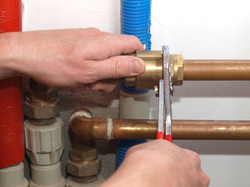
More and more homeowners are choosing to take on home repair jobs themselves rather than calling in a contractor. While some jobs are still best left to the professionals, an understanding of the equipment involved in updating your home systems can be of great value. You’ll maximize the value of your improvements by choosing the price point of materials that meet your needs. You’ll also be able to negotiate contractor bids more effectively by understanding the job and its requirements.
As homes and communities are updating, public water and sewer ties-ins are an area where savvy homeowners can take the lead on their home improvement. Depending on your knowledge of basic plumbing, maintaining you own in-line check valves can be an option. An in-line check valve makes sure fluids flow only in the intended direction. This prevents reversed flow, flooding, and a host of other potential problems.
In-line check valves are around ten dollars to replace, so if can handle them you can probably save a plumbing bill. Failure to maintain them can lead to a lot of problems. Water damage from a faulty check valve would be bad enough, but a backed up plumbing situation can rapidly become a nightmare. If you do your homework you’ll know the warning signs and be able to address them quickly.
If you’re not tied in to public water, it’s probable that you are on a private well. One thing to watch out for in this case is low water pressure, as well as potential contaminants and chemical compounds. If your water system is even a decade old, it’s very probable that a better solution is available. Deep well pumps continue to improve, and traditional wells are becoming outdated. Even the pipes transporting the water may have become rusted or eroded over time, exposing you to hard water and other issues.
Replacing your current water system is certainly not a do it yourself, at least for most people, but making an informed decision should be a priority. Deep well submersible pump prices and specifications are readily available online. With the assistance of a professional you have everything you need to navigate your options.
Replacing your water heater valves is a task that you probably can take care of on your own. If you notice it dripping, you may be able to clear debris in the line or simply change out a washer. However, if it becomes necessary to replace it’s important to understand the job at hand. Plastic isn’t reliable, most would agree you should go with brass. If you are getting a new valve, it’s worth looking for one with a replaceable washer to minimize future repair costs.
Replacing HVAC control valves yourself should not be attempted unless you have experience. Any leaks or errors can prove costly and inefficient. However, this is yet another area where understanding how the system works can prove very valuable to you as homeowner in the long run.
As homes and communities are updating, public water and sewer ties-ins are an area where savvy homeowners can take the lead on their home improvement. Depending on your knowledge of basic plumbing, maintaining you own in-line check valves can be an option. An in-line check valve makes sure fluids flow only in the intended direction. This prevents reversed flow, flooding, and a host of other potential problems.
In-line check valves are around ten dollars to replace, so if can handle them you can probably save a plumbing bill. Failure to maintain them can lead to a lot of problems. Water damage from a faulty check valve would be bad enough, but a backed up plumbing situation can rapidly become a nightmare. If you do your homework you’ll know the warning signs and be able to address them quickly.
If you’re not tied in to public water, it’s probable that you are on a private well. One thing to watch out for in this case is low water pressure, as well as potential contaminants and chemical compounds. If your water system is even a decade old, it’s very probable that a better solution is available. Deep well pumps continue to improve, and traditional wells are becoming outdated. Even the pipes transporting the water may have become rusted or eroded over time, exposing you to hard water and other issues.
Replacing your current water system is certainly not a do it yourself, at least for most people, but making an informed decision should be a priority. Deep well submersible pump prices and specifications are readily available online. With the assistance of a professional you have everything you need to navigate your options.
Replacing your water heater valves is a task that you probably can take care of on your own. If you notice it dripping, you may be able to clear debris in the line or simply change out a washer. However, if it becomes necessary to replace it’s important to understand the job at hand. Plastic isn’t reliable, most would agree you should go with brass. If you are getting a new valve, it’s worth looking for one with a replaceable washer to minimize future repair costs.
Replacing HVAC control valves yourself should not be attempted unless you have experience. Any leaks or errors can prove costly and inefficient. However, this is yet another area where understanding how the system works can prove very valuable to you as homeowner in the long run.
 RSS Feed
RSS Feed